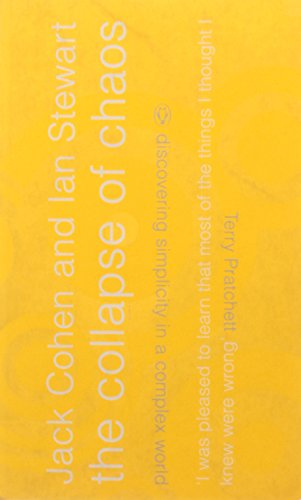
Synopsis
Do we live in a simple or a complex universe? Jack Cohen and Ian Stewart explore the ability of complicated rules to generate simple behaviour in nature through 'the collapse of chaos'. 'The most startling, thought-provoking book I've read all year. I was pleased to learn that most of the things I thought I knew were wrong' - Terry Pratchett.
"synopsis" may belong to another edition of this title.
About the Author
Jack Cohen is an internationally known reproductive biologist. Ian Stewart is Professor of Mathematics at the University of Warwick.
From Kirkus Reviews
Riding the wave of popularizations of chaos and complexity theory is this new contender by a pair of English science writers, Cohen, a biologist, and Stewart, a mathematician. Rather than enthuse about the C words, they ask another question: If the universe is chaotic, where do the simplicities of nature come from? Then they proceed, for fully half the book, to lay out the current reductionist paradigm by which cosmology, culture, evolution, intelligence, etc., are the consequences of lower level ``simpler'' principles: quantum mechanics, chemistry, the genetic code. That done--and done quite well despite a style that is sometime too breezy by half--they spend the rest of the book pointing to the inadequacies of reductionism and building toward two explanatory principles which they call simplexity and complicity. Simplexity is ``the emergence of large-scale simplicities as direct consequences of rules,'' e.g., the patterns that emerge in John Horton Conway's computer game of life; and by extension, any features that emerge from sets of similar ground rules. Complicity is more like convergent evolution: different sets of rules generating similar features (e.g., bat wings versus bird wings). Either principle brings about a collapse of chaos. Basically, what they are saying is that you can't simply map a lower level of organization, say, the DNA code, into a living organism. There is instead a dynamic in which content and context are critical. The argument is fine. However, had the authors avoided cutesy neologisms, visits to another planet, and other textural distractions, their many useful examples and well-taken points might have been even better taken. -- Copyright ©1994, Kirkus Associates, LP. All rights reserved.
"About this title" may belong to another edition of this title.
Other Popular Editions of the Same Title
Search results for The Collapse of Chaos: Discovering Simplicity in a...
The Collapse of Chaos Discover
Seller: World of Books (was SecondSale), Montgomery, IL, U.S.A.
Condition: Acceptable. Item in very good condition! Textbooks may not include supplemental items i.e. CDs, access codes etc. Seller Inventory # 00076355309
The Collapse of Chaos Discover
Seller: World of Books (was SecondSale), Montgomery, IL, U.S.A.
Condition: Good. Item in very good condition! Textbooks may not include supplemental items i.e. CDs, access codes etc. Seller Inventory # 00074666992
The Collapse of Chaos Discover
Seller: World of Books (was SecondSale), Montgomery, IL, U.S.A.
Condition: Good. Item in very good condition! Textbooks may not include supplemental items i.e. CDs, access codes etc. Seller Inventory # 00073139757
The Collapse of Chaos: Discovering Simplicity in a Complex World
Seller: ThriftBooks-Dallas, Dallas, TX, U.S.A.
Paperback. Condition: Good. No Jacket. Pages can have notes/highlighting. Spine may show signs of wear. ~ ThriftBooks: Read More, Spend Less. Seller Inventory # G0140291253I3N00
The Collapse of Chaos: Discovering Simplicity in a Complex World (Penguin Science)
Seller: AwesomeBooks, Wallingford, United Kingdom
Paperback. Condition: Very Good. The Collapse of Chaos: Discovering Simplicity in a Complex World (Penguin Science) This book is in very good condition and will be shipped within 24 hours of ordering. The cover may have some limited signs of wear but the pages are clean, intact and the spine remains undamaged. This book has clearly been well maintained and looked after thus far. Money back guarantee if you are not satisfied. See all our books here, order more than 1 book and get discounted shipping. Seller Inventory # 7719-9780140291254
Buy Used
Quantity: 1 available
The Collapse of Chaos: Discovering Simplicity in a Complex World (Penguin Science)
Seller: WorldofBooks, Goring-By-Sea, WS, United Kingdom
Paperback. Condition: Very Good. The book has been read, but is in excellent condition. Pages are intact and not marred by notes or highlighting. The spine remains undamaged. Seller Inventory # GOR001270325
Buy Used
Quantity: 4 available
The Collapse of Chaos: Discovering Simplicity in a Complex World (Penguin Science)
Seller: Bahamut Media, Reading, United Kingdom
Paperback. Condition: Very Good. This book is in very good condition and will be shipped within 24 hours of ordering. The cover may have some limited signs of wear but the pages are clean, intact and the spine remains undamaged. This book has clearly been well maintained and looked after thus far. Money back guarantee if you are not satisfied. See all our books here, order more than 1 book and get discounted shipping. Seller Inventory # 6545-9780140291254
Buy Used
Quantity: 1 available
Collapse of Chaos : Discovering Simplicity in a Complex World
Seller: Better World Books Ltd, Dunfermline, United Kingdom
Condition: Good. Reprint. Ships from the UK. Used book that is in clean, average condition without any missing pages. Seller Inventory # 15304777-6
Buy Used
Quantity: 1 available
Collapse of Chaos : Discovering Simplicity in a Complex World
Seller: Better World Books Ltd, Dunfermline, United Kingdom
Condition: Good. Reprint. Ships from the UK. Former library book; may include library markings. Used book that is in clean, average condition without any missing pages. Seller Inventory # 5305023-6
Buy Used
Quantity: 2 available
The Collapse of Chaos: Discovering Simplicity in a Complex World
Seller: Anybook.com, Lincoln, United Kingdom
Condition: Good. This is an ex-library book and may have the usual library/used-book markings inside.This book has soft covers. In good all round condition. Please note the Image in this listing is a stock photo and may not match the covers of the actual item,400grams, ISBN:9780140291254. Seller Inventory # 9366984
Buy Used
Quantity: 1 available

